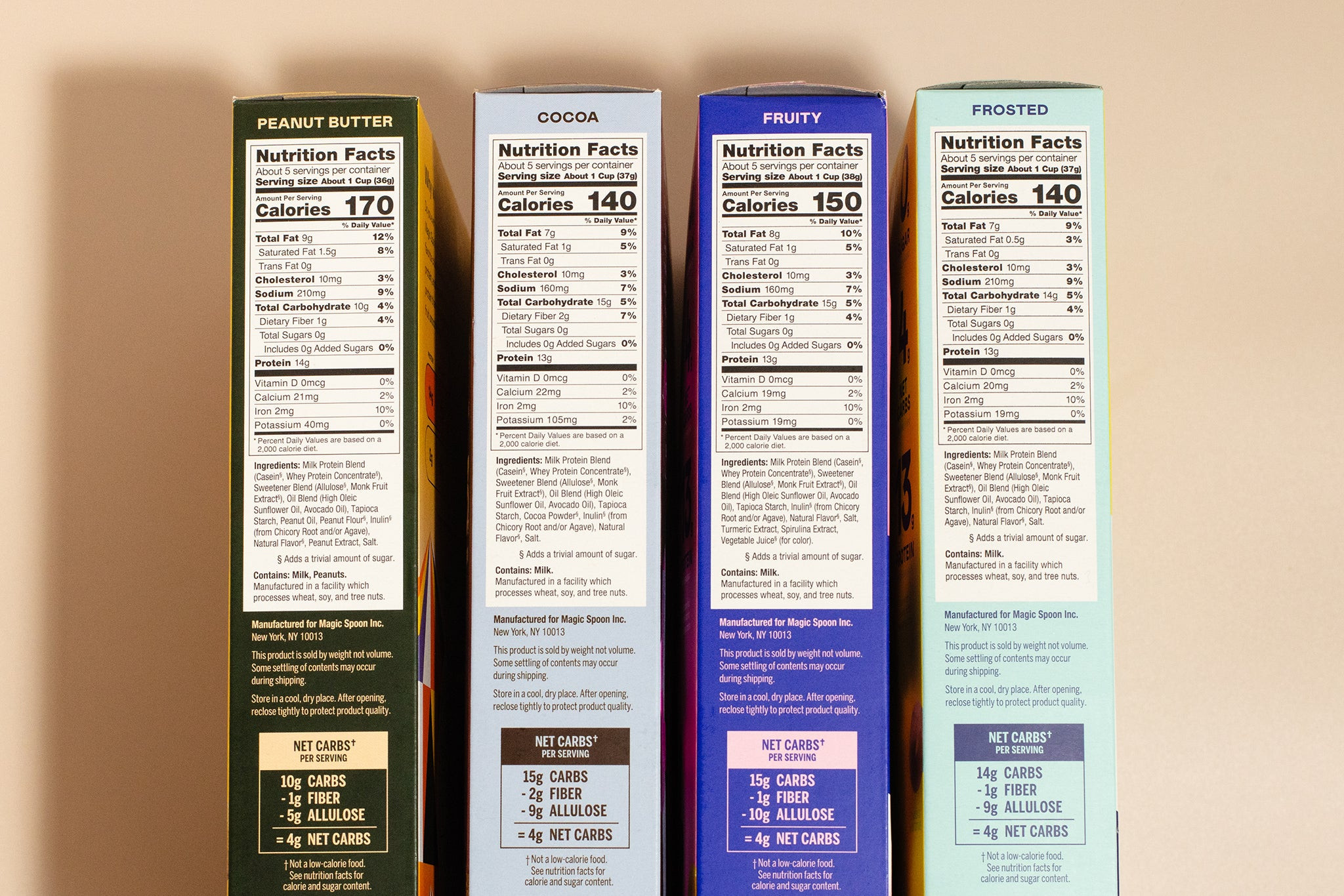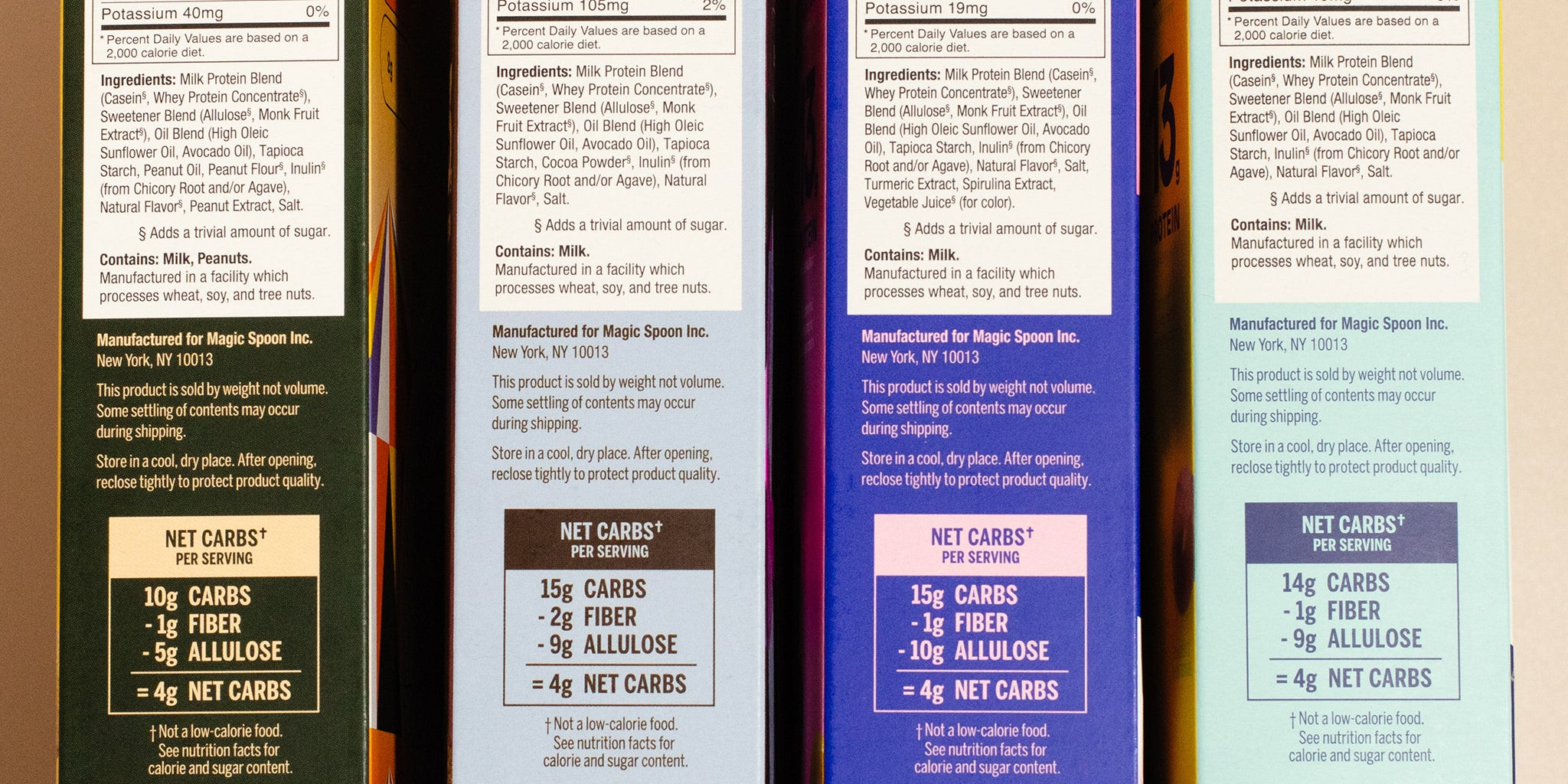Foods marketed as sugar-free or low in artificial sweeteners, such as cereals, ice creams, and candies like Magic Spoon, have become increasingly popular recently. This surge is largely due to a natural sugar substitute called allulose.
 The nutrition facts of four different boxes of Magic Spoon cereal, shown side by side.
The nutrition facts of four different boxes of Magic Spoon cereal, shown side by side.
Allulose, the sweetener found in Magic Spoon, is metabolized differently by the body compared to common sugar. Consequently, it is not required to be listed as part of the total or added sugars on nutrition labels. This regulatory change by the FDA in 2019, prompted by new research, has led to a rush of companies utilizing allulose. This approach appears to have a basis in scientific evidence.
Debbie Fetter, an assistant professor in the Department of Nutrition at the University of California Davis, specializing in nutritional biology, explained in an interview that “data suggests that allulose is metabolized differently from other sugars.” Typical sugars, disaccharides of glucose and fructose, are broken down and absorbed in the small intestine, entering the bloodstream. This process elevates blood glucose levels, triggering insulin release to transport glucose into body cells for energy and subsequently lower blood glucose levels.
However, consuming excessive amounts of common sugars over time can lead to insulin resistance. This might not be the case with allulose-sweetened foods. Research indicates that allulose is not converted into energy in the same way as common sugars, thus it does not significantly raise blood glucose or insulin levels after consumption.
Personal experiences often reflect scientific findings. Many find the taste of food sweetened with sugar alternatives like erythritol (a sugar alcohol) or stevia (derived from the stevia plant) unpalatable. Surprisingly, Magic Spoon, sweetened with allulose, offers a pleasant taste and sweetness. While it may not perfectly mimic the flavor of cereals like Lucky Charms or Frosted Flakes, it provides a satisfyingly sweet alternative.
 The list of ingredients and carbs facts of four different boxes of Magic Spoon cereal, shown side by side.
The list of ingredients and carbs facts of four different boxes of Magic Spoon cereal, shown side by side.
Similar to other products in the market, Magic Spoon highlights a “net carb” calculation on its packaging and in marketing materials. However, nutrition experts advise caution regarding this measurement. Net carbs are generally calculated by subtracting fiber and non-metabolized sweeteners like allulose from the total carbohydrates. Despite the listed sugar content being regulated, the concept of net carbs lacks formal recognition.
Fetter clarifies that “it’s not used by the FDA or American Diabetes Association, there isn’t a standardized way to calculate [it].” This lack of standardization can lead to “misleading information,” making it challenging to accurately determine the digestible and absorbable carbohydrate content.
For instance, a serving of Magic Spoon might contain 15 grams of total carbohydrates, including 1 gram of fiber and 10 grams of allulose. Although the nutrition label indicates 15 grams of carbohydrates, the prominently featured “net carbs” are only 4 grams. While this might align with certain dietary restrictions or fad diets, Fetter emphasizes that tracking “net carbs” is not a reliable method for individuals managing carbohydrate intake for medical reasons, such as controlling blood glucose levels in diabetes.
In conclusion, while allulose presents a promising alternative to common sugar by offering sweetness without the typical blood sugar impact, the concept of “net carbs” associated with products like Magic Spoon should be approached with caution, especially for those with specific dietary needs related to blood sugar management. The focus should remain on understanding the overall nutritional profile and consulting with healthcare professionals for personalized dietary advice.

